The History Of FORD Taurus

The Ford Taurus is an automobile manufactured by the Ford Motor Company in the United States. Originally introduced in the 1986 model year, it has remained in near continuous production for more than two decades, making it the fourth oldest nameplate that is currently sold in the Ford lineup. It has had a more upscale Mercury branded version entitled the Sable (1986-2005; 2008-2009), as well as a performance variant, the Ford Taurus SHO (1989-1999). It was a front-wheel drive mid-size car during its first production run, and it is now a full-size car available in front- or all-wheel drive. It is currently sold alongside a crossover SUV variant, the Ford Taurus X.
The original Taurus was a milestone design for Ford and the entire American automotive industry, as well as a very influential vehicle that brought many new features and innovations to the marketplace. Since its launch in 1986, Ford has sold over 6.7million Tauruses worldwide as of 2007, making it the fifth bestselling North American nameplate in Ford's history; only the F-150, Escort, Model T, and Mustang have sold more units. Between 1992 and 1996, the Taurus was the best-selling car in the United States, eventually losing the title to the Toyota Camry in 1997
In the late 1990s and early 2000s, sales of the Taurus declined as it lost market share to Japanese midsize sedans, and as Ford shifted resources towards developing SUVs. It was discontinued in 2006, with production initially ending on October 27, 2006 and 2007 being the last model year. Rather than investing in an older nameplate, Ford had decided to replace the Taurus with the fullsize Five Hundred and midsize Fusion sedans, as well as replacing the Taurus wagon with the Freestyle crossover SUV.
However, Ford revived the Taurus name a few months later by renaming two new models that were intended to be facelifted versions of the Ford Five Hundred and Ford Freestyle "Taurus" and "Taurus X", respectively.. The all-new 2010 Taurus will become available July 2009.
Main article: First-generation Ford TaurusThe first-generation Taurus was launched in 1985 as a 1986 model to strong fanfare and sales, replacing the slow-selling[citation needed] LTD LX. Upon the Taurus' debut, Ford was producing a range of rear-wheel drive cars, as Chrysler and General Motors offered more front-wheel drive vehicles. With the introduction of the Tempo, Ford had started its own transition to front-wheel drive. The Taurus displayed a rounder shape than its contemporaries, often likened to a 'jelly bean' or 'flying potato', inspired by the design of the Audi 5000 and Ford's own Tempo. The aerodynamic design of the Taurus also made the car more fuel efficient, allowing Ford to meet the more stringent Corporate Average Fuel Economy (CAFE) standards applied by the United States government. The Taurus' success ultimately led to an American automobile design revolution; Chrysler and General Motors developed aerodynamic cars in order to capitalize on the Taurus' success.
Along with the exterior of the Taurus, its interior was ahead of its time, and many features originating from it are still used in most cars today. The interior was designed to be extremely user friendly, with all of its controls designed to be recognizable by touch, allowing drivers to operate them without taking their eyes off the road. For example, the switches to the power windows and power locks were designed with one half of the switch raised up, with the other half recessed, in order for its function to be identified by touch. To further enhance this "user friendliness", the dashboard was designed to have all of the controls in the central area, within reach of the driver. The left side of the dash also curved slightly around the driver, to make controls easily accessible as well as creating a "cockpit" feel. However, it wasn't curved enough to prevent the passenger from easily identifying and using the vehicle's main controls as well.
The interior of the Taurus was highly customizable to fit buyers' needs, having a large number of options as well as being available in three different configurations. This meant that the interior of the Taurus could be spartan or luxurious, depending on the buyer's choice of options. On models with an automatic transmission, the Taurus' interior was available in three different seating configurations. The interior equipment depended on model. The most basic model, the L (see below), came standard with just an AM radio and a front cloth bench seat, while the LX, the highest model, came with a large amount of standard equipment.
The 1986 Taurus was received very well by both the public and the press. It went on to win many awards, most notably being named Motor Trend's Car of the Year for 1986, as well as being named on Car and Driver's Ten Best List for 1986. Over 200,000 Tauruses were sold for the 1986 model year, and in 1989, the millionth Taurus was sold. When production ended in 1991, more than 2,000,000 First-generation Tauruses had been sold.
Taurus offered a 2.5-liter four-cylinder model from 1986 to 1988 dubbed the "MT5". It was exclusive to the sedan body and was not available on any Mercury Sable version. The Taurus MT5 can be identified by badging on the trim near the front doors.
This car was used in the 1987 cyberpunk film RoboCop directed by Paul Verhoeven.
Main article: Second-generation Ford TaurusThe Taurus received its first cosmetic update in 1992. The exterior of this generation got completely redesigned from the previous one. Its length was increased by a few inches, and was a couple of hundred pounds heavier than the previous generation. Every body panel, save for the doors, was redesigned. However, many of the redesigned components closely resembled that of the previous generation, leading many to falsely believe that this generation is just a face-lift of the previous generation.
The interior was also completely redesigned for 1992. The Taurus received a new dashboard that, like the previous generation, was designed to be user friendly. Like the previous generation, it had all of the vehicle's main controls located near the left side of the dash, to be within the easy reach of the driver. As in the previous generation, all of the controls were designed to be recognizable by touch, and to be operated by drivers without taking their eyes off the road. The new dash also contained three buttons by the gauge cluster that allowed drivers to operate the radio without taking their eyes off the road. The radio was also redesigned, while the rest of the lower dash was carried over from the previous generation, as was the steering wheel. The new dash was also designed to contain a passenger's side airbag, a first of its kind. It was optional in 1992, and became standard in 1994, making the Taurus the first car of its kind to have standard dual front airbags.
This generation sold just as well as the First-generation, and became the bestselling car in the United States, a title it would retain for as long as this generation was sold. When production ended in 1995, more than 1,400,000 Second-generation Tauruses had been sold.
Main article: Third-generation Ford TaurusThe 1996 model year saw the first complete redesign of the Taurus. It used a controversial new shape that chief designer Jack Telnack claimed was penned to make the Taurus stand out to sedan buyers, and compared the current Taurus to the likeness of a pair of slippers. This shape was based upon that of an oval, which was perhaps inspired by that of Ford's own logo, and while the previous Taurus used a flat, streamlined shape, this Taurus used a rounded shape similar to that of the Chrysler Concorde. Station wagons also got new sheet metal, although from the firewall back, the Taurus and Mercury Sable wagons again shared the same panels, with all station wagon doors being the same as those used on the Sable sedans. As the new-generation Taurus was aimed at a more mature, affluent customer base, its exterior contained many upscale styling touches. For example, the LX came with chrome alloy wheels, chrome dual exhaust tips, and the "Taurus" badge on the back was written in script, as opposed to the block letters used in previous generations.
The interior was also completely redesigned for the 1996 model year. Like that of the previous two generations, the interior was designed to be user friendly. The dashboard wrapped slightly around the driver; all of the main controls were placed within easy reach, and were designed to be recognizable by touch and to be operated by drivers without taking their eyes off the road. The controls for the radio and climate control were combined into an oval shaped "Integrated Control Panel" mounted in the center of the dash, which was created in response to many complaints from Taurus owners that they couldn't easily operate the main controls of the radios and climate control systems without taking their eyes off the road. Another new innovation was the "Flip-Fold" center console, in which on bench seat equipped cars, the middle section could be transformed into a console; the seat cushion folded out into a console with a lockable storage bin and cupholders, while the seatback folded down to become an armrest. A traditional center console with a floor mounted shifter was installed on cars equipped with bucket seats.
Reaction to this new generation of Taurus was mixed. Ford found that customers were turned off by the car's oval shape, and although it managed to retain its title as the bestselling car in the United States, this was only because of heavy sales to rental fleets; 51% of all Taurus sales for 1996 went to rental fleets, in contrast to the Honda Accord and Toyota Camry, of which the majority of sales were to private customers through retail outlets. The Taurus would go on to lose its bestselling title in 1997 to the Camry.
This model was particularly engineered for both left- and right-hand-drive market, namely Australia, New Zealand, Hong Kong, and Japan. Extensive changes were made to tailor those markets. The front fenders are extended out bit further for Japanese requirement. The separate turn signal and side lamps are fitted to the bumpers. The headlamps are taken from Mercury Sable. The Taurus was to replace the recently discontinued Ford Telstar Ghia (popular Mazda-sourced model) in Australia. Unfortunately, the limited engine choice and bizarre styling doomed its premiere. Ford Australia ceased importing and marketing Taurus after six months of sale.
Main article: Fourth-generation Ford TaurusThe Taurus received another redesign for 2000, which replaced many of the oval derived design elements of the previous model. To reduce the price and keep it competitive, Ford did cost cutting on the car in 1999, such as giving the Taurus sedan rear drum brakes on ABS equipped vehicles (previously, upgrading to ABS included the addition of rear disc brakes), eliminating the dual exhaust on the higher end models, and trimming many other small features.
When the third generation Taurus debuted, it was hurt by criticism of its design, which was formed from oval derived design elements. The design was very controversial, and it strongly limited the appeal of the car. As a result, for the fourth generation Taurus, Ford designed it with much more conservative styling in hopes of increasing the car's appeal. Instead of sloping back, this car's trunk stood upright in a more traditional shape, which increased trunk space by another two cubic feet. The roof was also raised into a more upright stance to increase headroom, which can be evidenced by the thicker C-pillar and larger area between the tops of the doors and the top of the roof.
The interior was also completely redesigned with a more conservative shape, although some features from the previous cars were carried over. The dashboard was redesigned with a more conservative design that went straight across the front, as opposed to curving around the driver like in the previous generation. The "Integrated Control Panel" was carried over yet redesigned, although it was made in a bigger, square shape, and placed in the center of the dash instead of being angled toward the driver. The Flip-Fold center console was also carried over from the previous generation, although it was revamped as well. When folded out, it now rested against the floor instead of the dashboard, and had revamped cupholders and storage areas. Unlike the previous three Tauruses, this one offered rear cupholders that either slid or folded out of the front console, depending on which console the car was equipped with.
Main article: Ford Five HundredTaurus sales had slumped significantly in the years prior to its demise, losing significant market share to Japanese sedans. Due to waning popularity and customer demand, Ford decided to slowly discontinue the Taurus. Production of the Taurus wagon was discontinued on December 8, 2004; sedan retail sales halted after a short 2006 model year, and the Taurus became sold exclusively to fleets in the United States, while still being sold to retail customers in Canada. Production ended on October 27, 2006, as Ford idled the Atlanta plant, as part its The Way Forward restructuring plan.
The last mid-size Ford Taurus rolled off the assembly line around 7:00am, destined for delivery to S. Truett Cathy, owner of Chick-fil-A. Mr. Cathy's original restaurant was located across from the Ford Atlanta plant. There was no official event or function of any kind to mark the end of production. Rather than investing in an older nameplate, Ford had decided to replace the Taurus with the fullsize Five Hundred and midsize Fusion sedans, as well as replacing the Taurus wagon with the Freestyle crossover SUV.
The discontinuation of the Taurus was controversial. While many believed that the Taurus was discontinued because it could no longer compete in the growing sedan market, others believed that if Ford wanted to save the car, they could have easily done so. Autoblog went as far as calling the Taurus the biggest fall from grace in history, and even blamed Ford's current financial problems on their failure to keep the Taurus competitive, as well as how they focused nearly all of their development resources and marketing on trucks and SUVs. The Truth About Cars published a review/ editorial also showing their disappointment at how Ford neglected the Taurus to the point where it became a "rental car"
MSNBC interviewed many Ford workers who felt that Ford unjustly abandoned the car that had done so much to revitalize Ford and the US industry. In an October 25, 2006 USA Today editorial, "How Ford starved its Taurus" it was noted that the Japanese stick with their winners and make them better (such as the Toyota Corolla, which has been in continuous production since the 1960s), while Detroit automakers retires cars or entire division nameplates in search of "the next big thing".
However, after Alan Mulally took position as Ford's CEO, rumors were rampant that he was interested in reviving the Taurus. These were fueled by the fact that he said in an interview with the Associated Press that he was baffled to find out that the Taurus had been discontinued when taking position as CEO at Ford, as well as stating that he believed that discontinuing the Taurus was a mistake, and that the Five Hundred should have been named "Taurus" from the beginning. The rumors of a possible Taurus revival were confirmed in mid 2007, when the revamped versions of the Five Hundred and Freestyle were unveiled as "Taurus" and "Taurus X" at the 2007 Chicago Auto Show, a decision that was influenced strongly by Mulally. In a later interview, Mulally explained that the fact that the Taurus was well known and had a positive brand equity associated with it strongly influenced his decision to revive the name.
Main article: Fifth-generation Ford TaurusThe Fifth generation Taurus was born out of the Ford Five Hundred, which was scheduled for a significant styling facelift update and power upgrade for the 2008 model year. Ford decided to redesignate that model the Taurus because of customer recognition and dealer demand. The 2008 Ford Taurus went into production in late 2007 as a 2008 model. It was determined that Ford's strategy to redesignate new cars in the lineup with new names beginning with the letter F, as in Ford Focus, Ford Fusion, and Ford Freestyle, was not a good marketing move, as some of the renamed cars had highly recognizable iconic names. The new F names were not as well known to be associated with Ford in the US, and consumers were confused by the name changes. Mulally believed that the Taurus had an immediately strong brand equity, and that it would take years for consumers to have a similar recognition of the Five Hundred.
Changes to the new Taurus from the existing Five Hundred include over 500 changes with the most obvious being a newly styled front end and the addition of the 263hp 3.5L Duratec 35 V6 which replaces the 203hp (151kW) Duratec 30 3.0L V6. The Five Hundred/ Freestyle's ZF-Batavia CVT, which had maximum torque capacity of 221lb·ft (300N·m), is also replaced with a Ford-GM joint venture six-speed automatic capable of withstanding the additional torque of the Duratec 35. The Aisin AW six-speed automatic that was used on FWD Five Hundred and Montegos was also replaced by the new six-speed. The Taurus sedan twin, the Mercury Sable nameplate, was revived from the Mercury Montego. For the 2009 model year, Ford revived the "SE" trimline for the Taurus. The SE sells for $24,125 according to Ford's website and now serves as the base model for the vehicle.
This generation of the Taurus is sold in the Middle East as the Ford Five Hundred from 2008 onward.
Main article: Sixth-generation Ford TaurusA 2010 model year Taurus is under development with the intention of going on sale in about mid 2009.
Left Lane Insider reported, May 28, 2008, the 2010 Taurus debuted at 2009 North American International Auto Show. Mulally stated on January 22, 2008 that the new Taurus is "the one we should've built originally".
A leaked photo has circulated on the internet of a prototype purported to be the 2010 Ford Taurus. Ford contemplated legal action against web sites which posted the photo to and included Ford attorneys asking site owners for the removal of the photo.
The 2010 Ford Taurus made its worldwide debut January 11, 2009 at the Detroit International Auto Show at Cobo Hall in early January 2009.
According to freep.com, the Taurus's counterparts, the Ford Taurus X and the Mercury Sable, will not be joining the Taurus for the 2010 model. Both vehicles are expected to cease production in Spring 2009 at the Ford Chicago Assembly Plant, with the 2010 Taurus coming into production in July.
The 2010 Taurus will be available in SE, SEL and Limited models, and will use the same 3.5L 263hp engine that was introduced in 2008 models. This new Taurus will be available with push-button start, an advanced SYNC system with navigation, heated front/ rear seats, a crash avoidance system for backing out of parking spaces, and a lane-change blind spot warning system, among many other technological additions.
http://www.edmunds.com/ insideline/ do/ News/ articleId=138388 "New Spy Photos: 2010 Ford Taurus" http://www.freep.com/ article/ 20081205/ BUSINESS01/ 81205017/ 1014/ rss13 "Ford Kills Taurus X, Mercury Sable..."
From Wikipedia, the free encyclopedia
More About FORD Taurus
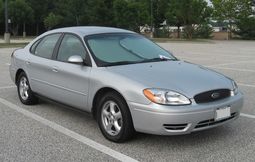
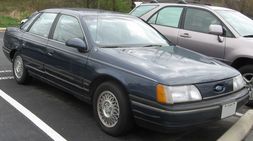
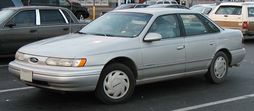
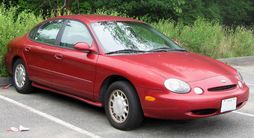
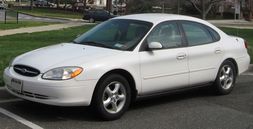
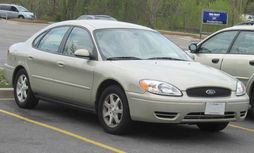
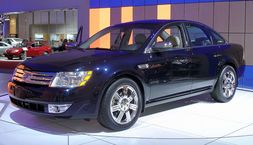
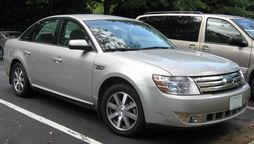
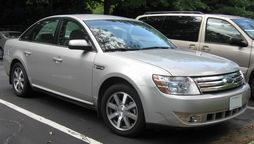
|